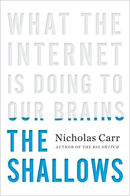The Shallows: What the Internet is Doing to Our Brains
 The Shallows: What the Internet is Doing to Our Brains by Nicholas Carr, Published by W.W. Norton & Co, 2010. 280 pp.
The Shallows: What the Internet is Doing to Our Brains by Nicholas Carr, Published by W.W. Norton & Co, 2010. 280 pp.
As the author notes, John Culkin said “We shape our tools and thereafter they shape us”. Nicholas Carr points out that how the human being thinks and acts has been heavily influenced by the tools we have created over the centuries – the clock, the map, the book. How then are we going to change as we become more heavily dependent on our latest tools, web-enabled computers? He looks at the scientific research into how our brains learn, think and remember, and how reading the printed book has strengthened and reinforced these skills in our brains. Then he looks at what the long-term effects of spending massive amounts of time online are going to be and the conclusions are not encouraging.
By spending much of their time online humans are developing “juggler’s brain”. We become better at cursory reading rather than deep reading. Our reading is more rushed, distracted and inefficient, rather than focused and contemplative. Our attention spans get shorter and there is cognitive overload of our working memory so that we have very poor transfer into long-term memory.
Why would we willingly come to rely on a tool that handicaps our brain and makes it harder to carry out the complicated, creative thought processes that have helped mankind to advance so far through the centuries? Well, for one thing, the addictive entertainment value of the Internet makes it hard to resist. Then it appears that the “juggler’s brain” is tapping into our species’ old pattern of behavior, scanning the environment for threats and opportunities rather than focusing on any one thing closely. Then we have the Googles and Microsofts of the world that have a vested interest in pushing as much human activity onto the Internet as possible to increase their revenues. Of course there are those in academia and the media who insist that any new technology is a better technology and any who resist the latest technology are Luddites. And of course up to this point we could plead ignorance and say that we did not realize the harm we were doing to our brains by allowing the Internet to take over our lives.
But the research is stacking up and this book is a call to arms. Facebook, youtube, google, etc. are quickly taking over our home lives so the public schools are the logical place to counterbalance the effects of the Internet by effective use of print resources to help young people become strong readers and thinkers. When television took over as the popular media the schools didn’t respond by replacing all their books with videos. But will the schools take the path of least resistance and replace the school library with Google and ebooks and create a generation of surfers and cut-and-pasters? Only time will tell, and at the moment it doesn’t look encouraging.
– Reviewed by Bob Sibert
